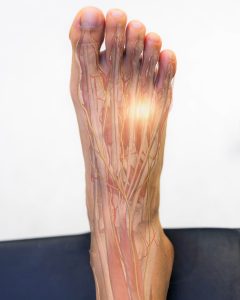Is That Pesky "Pebble in Your Shoe" Feeling a Neuroma? Here’s What You Need to Know
Have you ever experienced that nagging sensation in the ball of your foot,
almost like there’s a tiny stone stuck inside your shoe? It’s frustrating, isn’t it?
But did you know that this persistent discomfort might be a sign of a condition called a neuroma? Specifically, Morton’s neuroma, a benign (non-cancerous) growth of nerve tissue, can cause sharp pain, tingling, or a burning sensation between your toes. If you’ve been struggling with this type of pain, you’re not alone. This condition is more common than you might think, especially among those who wear tight shoes or engage in repetitive activities. But don’t worry, relief is possible!
Common Symptoms of a Neuroma
If you’re wondering whether this could be what’s causing your foot pain, here are the most common symptoms of a neuroma:
Sharp or Burning Pain: This typically occurs in the ball of the foot, especially when walking.
Tingling or Numbness: You might feel a sensation of “pins and needles” in your toes.
The “Pebble” Sensation: The feeling that you’re walking on something small and hard, like a stone, is a hallmark sign.
These symptoms tend to worsen when wearing tight, narrow, or high-heeled shoes and may improve when you remove your shoes or rest. This is because the pressure on the nerve is temporarily relieved.
What Causes a Neuroma?
Neuromas often develop due to long-term pressure or irritation on a nerve. Common contributing factors include:
Tight Footwear: Wearing shoes that pinch your toes or place pressure on the ball of the foot can lead to nerve irritation.
Foot Deformities: Conditions like bunions or flat feet can increase the likelihood of developing a neuroma.
Repetitive Motion: Activities like running, which involve repeated stress on the feet, can contribute to nerve compression.
Women are particularly prone to neuromas, especially those who wear tight or high-heeled shoes regularly. But men can also develop neuromas, especially if they have foot structural issues or engage in high-impact activities.
How Can Yorkshire Foot Hospital Help?
At Yorkshire Foot Hospital in Leeds, we understand how debilitating foot pain can be, and we’re here to help you find relief. The good news is that most neuromas can be effectively managed with non-surgical treatments, including:
Wider, Supportive Shoes: Opting for footwear with a wider toe box can alleviate pressure on the nerve.
Custom Orthotics: Tailored insoles can help distribute pressure more evenly across your feet, reducing strain.
Anti-Inflammatory Medication: Over-the-counter pain relievers can help reduce swelling and ease discomfort.
Corticosteroid Injections: In some cases, an injection can help reduce inflammation and improve pain relief.
If conservative treatments don’t offer sufficient relief, our expert surgeons can perform a minor procedure to decompress or remove the affected nerve. This surgery is typically quick, minimally invasive, and offers long-lasting pain relief.
How to Prevent a Neuroma
While it’s not always possible to completely avoid developing a neuroma, there are steps you can take to reduce your risk:
Choose Well-Fitting Shoes: Avoid footwear that constricts your toes or adds pressure to the ball of your foot.
Limit High Heels: Wearing heels puts excessive strain on your feet and can increase the risk of a neuroma.
Maintain a Healthy Weight: Extra weight puts more pressure on your feet, so staying at a healthy weight can help reduce your risk.
Stretch Regularly: Stretching your feet and calves can help alleviate tension and improve circulation.
Take the First Step Towards Pain-Free Feet








